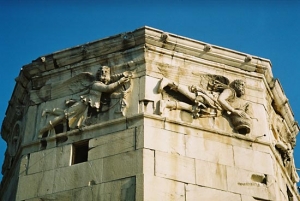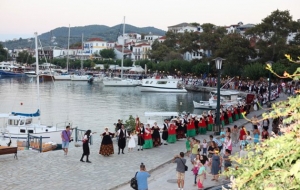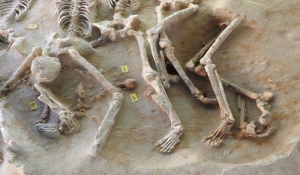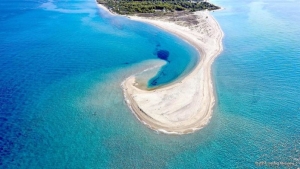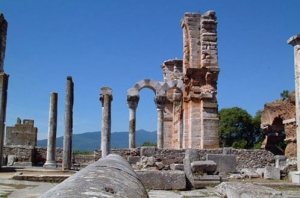ABOUT US
XpatAthens
Monday, 29 August 2016 07:00
The History Of Olive Oil In Ancient Greece
Olive oil is always present at the Greek table and nearly every dish Greek cooks prepare uses this highly prized oil.
According to legend, Athena, the Goddess of Wisdom, is responsible for giving Athens the olive tree as a gift. It is unclear in some of the re-telling of this story whether other parts of Ancient Greece already had the olive tree or not. However, the story shows that the olive tree was highly important to the people of Ancient Greece.
In the legend, Athena and Poseidon were in competition over who would have the new city-state named after them. Poseidon struck the ground with his staff and gave the Athenians the gift of flowing salt water. Athena struck the ground with her staff and it turned into an olive tree.
Since the olive tree provided wood, nourishment, and trade, she won. The olive tree became a symbol of peace because of this victory.
Even though Athena is credited with giving the Athenians the gift of the olive tree, it is really the Early Minoan Civilization on Crete who displays evidence of being the first to cultivate the olive tree in 3500 BC.
Over time, the Minoans on Crete perfected the process of cultivating the tree and it became an important part of their culinary tradition and also helped generate income through trade. They were the first to export olive oil to both Africa and the Middle East.
The Ancient Greeks understood that olive oil was highly nutritious. Therefore, top philosophers and physicians in the 7th century BC in Ancient Greece explored the use of olive oil as medicine. Hippocrates, for example, used it for various things when he was treating his patients. Nowadays, olive oil is used to help with digestive problems, skin conditions, coughs, sore throat, congestion, and other respiratory complaints.
It’s also considered a health cure and essential beauty aid. The oil is used to combat dry skin, control frizzy hair, and even soothe irritated skin. It even played an important part in the Olympic games by becoming a symbol of the games themselves and part of the award given to winners. The olive tree, therefore, was not only important in history, but it also is still highly important today.
To read this article in full, please visit: Greek Boston
To read this article in full, please visit: Greek Boston
Published in
Greek Food & Diet
Tagged under
Monday, 29 August 2016 07:00
Ancient Greece's Restored 'Tower Of Winds' Is Now Open To Public
After the restoration of the 2,000 year-old Aerides Clocktower, also known as the 'Tower of Winds,' is finally open to the public after 200 years. The Tower of Winds still stands at the bottom of Athens' Acropolis hill despite attempts by Lord Elgin to move it to Britain.
It is said to be the world’s first weather station and was used by merchants to tell the time – even in darkness. At nearly 14 meters (46 feet) tall, it is credited to the architect and astronomer Andronicus of Cyrrhus, but all these years later no one knows exactly how it worked.
Stelio Daskalakis, head of conservation, said “It was of great value for the merchants to read the weather and also tell the time their goods would arrive.”
Based on the most prominent theory, a hydraulic mechanism powered a water clock device with water flowing from a stream on the Acropolis hill.
“It’s unique in that such an important work was not a temple but had a utilitarian use,” Daskalakis said. “We don’t know who funded it, whether it was private or a high-ranking official.
Over the years, the Aerides Clocktower transformed from a weather station to a place of worship. Restorers discovered fragments of frescoes with Christian subject matter, including an angel and a saint on horseback. In addition, a mihrab niche was carved in the direction of Mecca and Ottoman inscriptions decorate its walls.
The monument has been largely shut to the public since the Dervishes left in 1828, barring brief use to store antiquities in 1843. The years took their toll, as did natural disasters, and pollution, prompting a full restoration, which began in 2014.
To read this article in full, please visit: Ekathimerini
To read this article in full, please visit: Ekathimerini
Published in
Local News
Tagged under
Tuesday, 30 August 2016 07:00
Traditional Dance Festival In Greece Wins European Award
The traditional dance festival called ‘Diamantis Palaiologos,’ held on Skopelos island this August, won a European award by the EILEEN (Enhancing Intercultural Learning in European Enterprises) project. There were over 600 participants and volunteers this year from Greece, Cyprus, Ukraine, and Nepal.
The Festival of Traditional Dances ‘Diamantis Palaiologos’ is a member of European Folklore Festival Association and is organized by Konstantina Angeletou, President of the Plegma, a nonprofit organization, along with the Thessaly Region.
The Greek National Commission to UNESCO, the Ministry of Culture, the Ministry of Education, Research and Religious Affairs, the Greek National Tourism Organisation and the Municipality of Skopelos embrace this big cultural event, putting the Festival under their auspices.
To read this article in full, please visit: Greek Reporter
To read this article in full, please visit: Greek Reporter
Published in
Greece In The News
Tagged under
Thursday, 01 September 2016 07:00
Ancient Grave Site Found Could Point To Earliest Date In Athenian History
What archaeologists found at the ancient Cemetery of Phaleron in Athens were at least 80 skeletons with their wrists clamped together in iron shackles.
Archaeologists have speculated and suggested that the skeletons appear to be the victims of a mass execution, but their crime still remains to be unknown.
What archaeologists are now saying with a new theory is that the skeletons came from the ‘Cylonian Affair’ from 632 BC, the earliest reliably dated event in Athenian history.
The event refers to a failed coup attempt led by aristocratic Cylon, who once plotted to overthrow the Athenian elites with the help of his tyrannical father-in-law. This was during a time of civil unrest in the ancient society.
The grave site of the Phaleron Delta necropolis is thought to date back between 8th and 5th centuries BC and is from a time of great social turmoil.
To test this theory, Dr. Stella Chryssoulaki who is head of excavations, said that more research is needed to confirm if the skeletons are the remnants of Cylon’s failed coup attempt. DNA tests could confirm this theory.
Over 1,500 bodies were buried in the Phaleron Cemetery, but unlike the renowned occupants of the Kerameikos cemetery where many elite Greeks were buried, the Phaleron Delta necropolis appears to be the final resting place of Athens’ everyday inhabitants from ordinary backgrounds.
Article Source: Euro News
Article Source: Euro News
Published in
Local News
Tagged under
Tuesday, 23 August 2016 07:00
Point - A Bar Restaurant
Author and blogger, Rebecca Hall, from Life Beyond Borders blog, shares her experience at Point, a restaurant and bar at the Herodion Hotel.
You don’t have to be a guest at the Herodian in order to enjoy an evening at Point a Bar Restaurant. Because of its proximity to the Parthenon and New Acropolis Museum, apparently the construction of the new restaurant and decor had to be approved by the Minister of Culture, in keeping with the ancient surrounding and so as not to stick out like a sore thumb. I’ll think you’ll agree that they managed it successfully.
Guests can expect an eclectic menu and cocktail list when they go to wine and dine here. With tapas dishes such as Olive oil sorbet ice-cream, Loukamades, and eggplant stuffed with onions, garlic, and tomatoes, visitors don’t leave hungry.
The view from Point a Restaurant and Bar is worth coming for alone, watch the full moon rise and relax with a drink.
Point is great for couples and groups as their rooftop bar and restaurant caters up to 80 people. You can sit on a communal dining table, intimate table arrangement or relaxing easy chairs, the choice is yours.
To read this article in full, please visit: Life Beyond Borders
To read this article in full, please visit: Life Beyond Borders
Published in
Restaurants In Athens
Tagged under
Monday, 22 August 2016 17:40
Stunning Pictures Of Greece From Above
An innovative site called TripInView hopes to change the way tourists perceive travel by presenting a bird’s eye view of the best sites that destinations have to offer. Their mission is to inform and offer the latest information on weather, location, and details regarding each destination from above.
TripInView takes geotagged aerial photographs and video of the entire coastline of countries that offer the best beaches and sun in a unique way. Here, they present Greece in a phenomenal way, from a bird’s eye!
Article Source: Greek Reporter
To view the FULL gallery of Greece from above, please visit: TripInView
Article Source: Greek Reporter
To view the FULL gallery of Greece from above, please visit: TripInView
Published in
Travel Greece
Tagged under
Thursday, 18 August 2016 07:00
Spiros Gianniotis Wins Silver For Greece In 10k Open-Water Swimming At Rio Olympics
After chartering through an Olympic course that avoids Brazil’s most controversial waters, Greek swimming legend Spiros Gianniotis proved that he had the endurance required, winning the Silver medal for Greece. Gianniotis was just shy of winning Gold, coming in behind Dutch Ferry Weertman by just a few milliseconds. Weertman swam the event in 1 hour 52 minutes and 59.8 seconds. Gianniotis came within a hair’s breadth of winning at 1:52:59.8.
About Gianniotis
Born in Corfu and half-English, Gianniotis is 35 years old and is a senior veteran of the Greek Swimming Federation. He enjoys a track record of success on the international stage after having won two FINA World Championships in the 10km marathon swim while also being a strong contender in every international competition he has participated in. Having participated in the Olympics for 2000, 2004, 2008 and 2016, he was armed with extra motivation in what was his final opportunity to win an Olympic medal.
To read this article in full, please visit: Greek Reporter
To read this article in full, please visit: Greek Reporter
Published in
Greece In The News
Tagged under
Tuesday, 16 August 2016 07:00
17 Awesome Greek Food Experiences In Athens
Author and blogger, Marissa Tejada, from My Greece My Travels dishes on some of the best food experiences in Athens!
One of the advantages to expat living in Greece is appreciating its beautiful food culture where people value authentic recipes and simple, fresh, and natural ingredients. I think this is why Greek food, and Mediterranean food, is so popular. Not only is it healthy – it’s delightfully delicious.
If you love Greek food or you are willing to try more than just the Greek gyro, I have compiled this list of awesome Greek food experiences you can have here when you visit Greece. I also suggest eateries in the city I know best, where I live, Athens.
Magirefta - Greek Home Cooking
Magirefta is slow-cooked food just the way a Greek mom would cook it!
Where to Find Magirefta
One of the top Greek restaurants in Athens is Mana’s Kouzina-Kouzina, known for the quality of the food and the value for money. The daytime menu specializes in these slow-cooked dishes, served cafeteria style. The variety of plates change seasonally and hail from all over Greece so you get a bit of a food tour of the country. More than moussaka – but that is always available — and it is the best I have had!
Greek Meze
Mezedes are a selection of hot and cold dishes, similar to appetizers or the famous Spanish tapas. Traditionally, you’d order a few of these small plates and share them with your group of friends with some ouzo or traditional Greek spirit.
Where to Find Mezedes
Kapetan Mixalis (Fidiou 6) in the center of Athens is a favorite for locals. In the suburbs, off-the-beaten-track Byraki Mezedopoleio (Nea Tripia 39-41) in Nea Filadelfia is a great destination for Cretan raki and wine, as well as delicious mezedes.
Greek Spirits
Awesome Greek food experiences must revolve around traditional drinks. Wine is one and Greek spirits are another. In Greece, Greek spirits are strong, tasteful and are meant to be sipped slowly as you enjoy some tasty meze (brings out the flavor of the food) and chat among friends.
You may have heard of ouzo or raki. These anise flavored liquors are served in small glass bottles and poured into oversized shot glasses. Other popular ones to try are rakomelo (honey infused raki), masticha (mastic flavored liquor) and citron (citrus infused liquor).
Where To Find Greek Spirits
A nice and atmospheric bar-type place to sample Greek spirits is Bretto’s in Plaka, famous for their selection of spirits. It is the oldest distillery in the city.
Greek Dessert
If you have a sweet tooth, Greek desserts will be one of those awesome Greek food experiences you’ll have in Greece. The zaharoplasteio is a part of Greek life! It is a Greek dessert and sweet shop, and the word literally translates to sugar workshop.
Where to Find Greek Desserts
Definitely go to Nancy’s Sweet Home in Psirri. This is the most famous dessert café in the heart of Athens, and rightfully so.
Another good option is Lukumades in St. Irene Square/Plateia Agia Irini in Monastiraki. They serve loukoumades, the traditional Greek fried doughnut balls topped with cinnamon and honey but you can also order them with all types of modern twists – stuffed with chocolate, with a scoop of rich ice cream or drizzled with delicious hazelnut syrup.
To read this article in full, please visit: My Greece My Travels
Published in
City Discovery
Tagged under
Tuesday, 16 August 2016 07:00
Greece's Philippi Inscribed On UNESCO’s World Heritage List
The archaeological site of Philippi in Northern Greece has been inscribed on UNESCO’s World Heritage List, which was announced during the 40th session of the World Heritage Committee in Turkey. Philippi’s addition on the World Heritage list brings the total of Greek world heritage sites to 18.
The remains of the walled city lie at the foot of an acropolis in the present-day region of Eastern Macedonia and Thrace, on the ancient route linking Europe and Asia, via the Egnatia.
Founded in 356 BC by the Macedonian King Philip II, the city developed as a “small Rome” with the establishment of the Roman Empire in the decades following the Battle of Philippi, in 42 BCE. The Hellenistic theatre and funerary heroon (temple) were supplemented with Roman buildings such as the forum. Later the city became a centre of the Christian faith following the visit of the Apostle Paul in 49-50 CE. The remains of its basilicas constitute an exceptional testimony to the early establishment of Christianity.
To read this article in full, please visit: Greek Travel Pages
Published in
Greece In The News
Tagged under
Monday, 15 August 2016 10:09
Trip To Greece By Melina Mallos
Trip to Greece is a colourful workbook with an interesting narrative in English, and Greek keywords to practise and learn. Each page offers multiple fun opportunities for your child to hear, speak, read and write Greek (activities vary on the child’s age and language ability).
As technology continues to connect the World, the skill of speaking a second language becomes more relevant and advantageous to our younger generations.
An Australian children’s’ educator and author has just created a unique tool for children in the Diaspora, bringing some fun and travel to the process of learning a second language.
Relocation to different countries for various reasons has also become very common, and these days, many people immigrate to countries with cultures and languages very different to where they were born and raised.
Children’s’ Multicultural Educator and Consultant, Melina Mallos, recognises the importance of promoting intercultural understanding among children, as well as promoting a firm connection with and appreciation of their own original cultural heritage.
Ms. Mallos, who was born and raised in Greece until the age of 6, is a high profile blogger and commentator on the subject of childhood intercultural understanding and appreciation for a number of years. She published her first bilingual children’s picture book in 2015, titled 'Catch that Cat!'
“We are fortunate to speak English here in Australia, a universal language, and therefore a lot of doors around the world automatically open for us. However, fluency in a second language will open up a whole new world of possibilities to your child. And there are reported health, social and intellectual benefits as well,” she said.
Ms. Mallos assures parents that there are multiple benefits for the child, aside from the obvious advantages of expansive life experiences, such as sharper brain functions, including listening, memory recall, better problem solving, improved critical thinking, greater cognitive flexibility, verbal and spatial abilities.
To purchase 'Trip To Greece,' please visit: Melina Mallos
About The Author
Ms. Mallos is a passionate writer, researcher and teacher with over 15 years’ experience working as a child educator in art museums in Australia. Ms. Mallos is also a frequent presenter at conferences, schools, libraries and community events. Her work has been featured in international journals, television and on the radio. In 2010, she was awarded a prestigious Queensland-Smithsonian Fellowship to research early learning programs in Washington D.C.
To purchase 'Trip To Greece,' please visit: Melina Mallos
About The Author
Ms. Mallos is a passionate writer, researcher and teacher with over 15 years’ experience working as a child educator in art museums in Australia. Ms. Mallos is also a frequent presenter at conferences, schools, libraries and community events. Her work has been featured in international journals, television and on the radio. In 2010, she was awarded a prestigious Queensland-Smithsonian Fellowship to research early learning programs in Washington D.C.
Published in
Books
Tagged under


